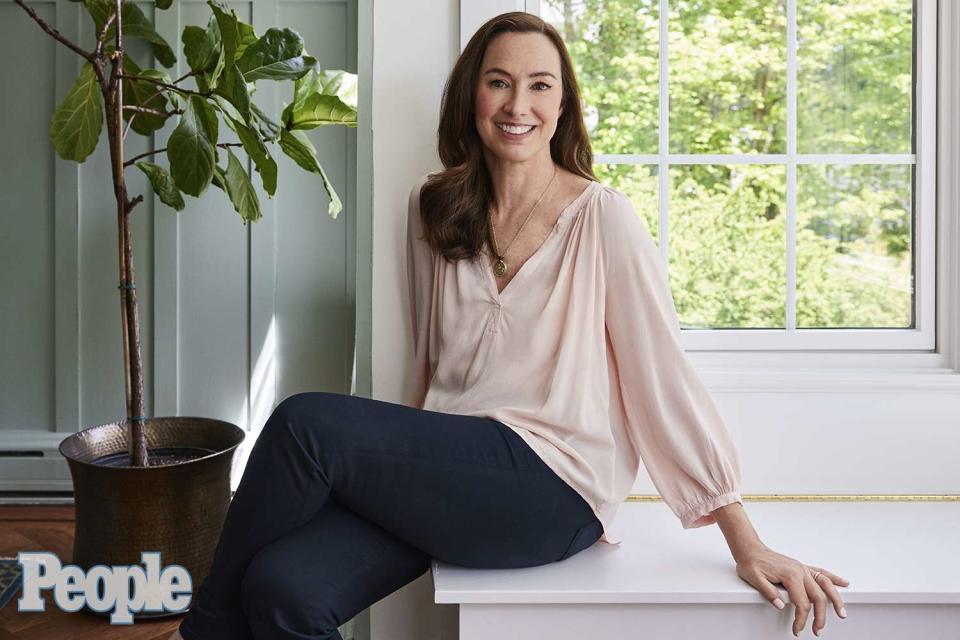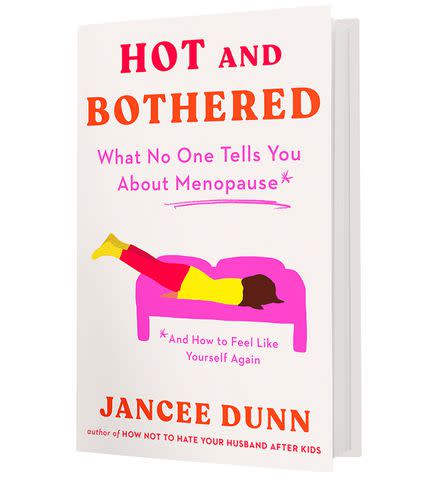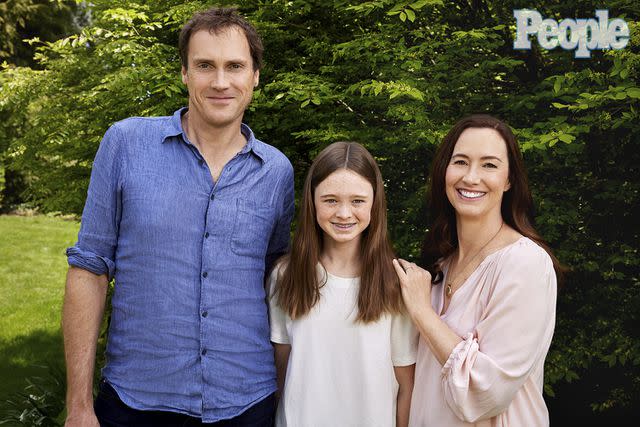Author Jancee Dunn's 10 Tips For Making It Through Perimenopause — and the 'Good Surprises' It Brings
In her new book, Hot and Bothered: What No One Tells You About Menopause, the best-selling writer shares her own story and takes the taboo out of the topic

Jancee Dunn was a 45-year-old mom of a toddler when she first began experiencing symptoms of perimenopause — a racing heartbeat, "crawlingly itchy" dry skin, night sweats so severe she was convinced she'd peed the bed.
But despite her years of experience as a health reporter, the bestselling author — along with her doctors — attributed it all to stress. Then when she missed a few periods, she assumed she was pregnant. "I had it in my head that menopause was for older ladies, and I was busy going to Mommy and Me classes with my young child," Dunn, now 57 and a columnist for The New York Times, tells PEOPLE in this week's issue.
Most women reach menopause — confirmed when 12 months have elapsed without a period— between the ages of 40 and 58, but symptoms can begin years earlier.
As she began researching her new book Hot and Bothered: What No One Tells You About Menopause and How to Finally Feel Like Yourself Again, Dunn realized she was far from the only clueless one. "Many doctors don't get any medical training about this stuff, and reproductive medicine sort of falls off a cliff after a woman has children," she says. "If the average [life span] is about 80, you could be in menopause for half your life, but this huge stage is all but ignored."

Dunn, who made a name for herself profiling stars like Madonna and Brad Pitt for Rolling Stone, admits "talking about your vaginal dryness isn't the sexiest topic in the world," but in writing her book, she learned some important lessons that she's applied to her own life's experience. She shares a few of them here:
1. CONSULT AN EXPERT: "If your ob-gyn is not trained in menopause, it's okay to get another one. You can go to the North American Menopause Society. That was revolutionary to me." And find some experts in your own family: "If older female relatives are living, ask questions! It took my mom a while to remember it—she'd suppressed it. But it will help you with your health information."
2. HELP IS AVAILABLE: "I really hope women will pay more attention to their quality of life. If hot flashes and night sweats are making you deranged, that is directly impacting your quality of life and you deserve to get treatment. And there are treatments out there for virtually everything." Dunn has found relief in regular walks and prioritizing sleep, but, she says, don't be afraid to seek out medical treatments as well. Hot flashes are not a mandatory rite of passage: "Fezolinetant is a great medication for hot flashes [recently approved by the FDA] that's going to be a game-changer."
Related:Oprah Winfrey Opens Up About Menopause, Says It's 'Ridiculous' to 'Fight, Resist' Aging
3. DON'T KEEP SECRETS FROM YOUR PARTNER: Because of vaginal dryness "sex started to hurt," Dunn says. "It's a very common symptom." But instead of telling her husband, fellow writer Tom Vanderbilt, "I just would avoid him. He thought I didn't care about him anymore." The experts she interviewed for her book finally persuaded her to open up: "He was so relieved. He didn't judge me. His body's changing too."
4. CHECK YOUR MENTAL HEALTH: "If you're in perimenopause, get screened for depression. If you are prone to depression, perimenopause can make it worse."
5. NORMALIZE THE DISCUSSION — EVEN WITH YOUR KIDS: "When I was younger, I had no idea my mother went through menopause. I just thought she was crabby all the time," Dunn says. When her own symptoms began, she realized she was repeating the pattern: "I was secretive and squirrelly about it, just like my mother was," she says. With her own daughter Sylvie, now 14, "I mention menopause casually and often, and I told her that it's kind of like puberty in reverse," she says. "She's at the point where she's rolling her eyes, which is good. My biggest wish is that when it's time for her, she'll just know what to do."

6. CONSIDER HORMONE THERAPIES: Dunn was "fully willing" to do hormone replacement therapy — many of the experts she interviewed are on HRT themselves, she says — but her doctor advised against it because of a family history of blood clots. "Taking hormones is a personal decision, but for vaginal dryness, topical vaginal estrogen is safe. And for me it's a fricking miracle."
7. MAKE PEACE WITH YOUR BODY CHANGES: "You may gain weight in your stomach, 5 to 7 lbs. on average. That's just biology. If your pants don't fit anymore, donate them and get new pants that fit. You just have to keep pivoting."
For more details about Jancee's experience, pick up the latest issue of PEOPLE, on newsstands now.
8. TRY USING A SCRIPT: Dunn says writing out what you want to share with family members or friends can make it easier to explain how you are feeling. She shares with her readers the script she used to talk to her own husband — and begins by explaining menopause is "not an illness; it's a natural life process that affects all women."
9. ACKNOWLEDGE THE LOWS: In her book, Dunn says she didn't want to be too "meno-positivity": "I don't want to be in denial some people have awful symptoms that deeply affect their quality of life." And she doesn't sugarcoat her own. She has experienced everything from "weird hairs sprouting up — like on my wrist! What's that about?" — to numbing brain fog.
10. KNOW THAT LIFE IS GOOD ON THE OTHER SIDE: "There's been a lot more good surprises than I realized," says Dunn. "You no longer have to worry about birth control or periods, and you can embrace your full self. Now I don't care what anyone thinks of me. Instead, you get to think of yourself a little more and what lights you up. And that's been exciting."
For more People news, make sure to sign up for our newsletter!
Read the original article on People.

 Yahoo Sport
Yahoo Sport 





































